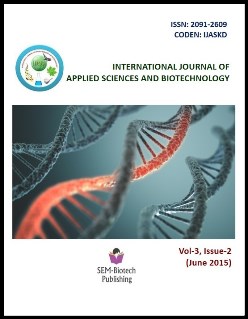Assessment of Genetic Diversity in Bamboo Accessions of India Using Molecular Markers
DOI:
https://doi.org/10.3126/ijasbt.v3i2.12587Keywords:
Bamboo, Bioethanol production, CO2 sequestration, Inter Simple Sequence Repeats markers, Lignocellulosic ethanol, Marginal land reclamation, Molecular markers, Salinity resistant screeningAbstract
Bamboo is an important grass with wide scale applications in paper industries, medicines, constructions industries. It is potential feedstock for advanced biofuel production due to its favourable characteristics, natural abundance, rapid growth, perennial nature and higher CO2 sequestration. The objective of this study is to understand genetic diversity between the bamboo accessions with respect to geographical origin to correlate molecular information with feedstock characterization and adaptation to abiotic stress. In this study, genomic DNA was extracted from twenty bamboo accessions collected from different regions of India and genetic variations were assessed by inter simple sequence repeat (ISSR) based molecular marker approach using 8 primers. Maximum genetic distance was observed between Bambusa wamin-Itanagar & B. ventricosa-Durg (0.48221) & minimum genetic distance between Bambusa balcooa-Modasa & Bambusa balcooa-Tripura (0.00787). Bambusa balcooa and Bambusa vulgaris were genetically similar as compared to other accessions. The genetic distance is independent of geographical distance for the bamboo accessions considered in this study. The findings of this study will help to understand the degree of differences between bamboo accessions under the same environmental conditions and to identify the representative accessions that can be used for abiotic stress resistance studies. The information can be explored for screening of closely related bamboo accessions for abiotic stress resistance screening trials.
Int J Appl Sci Biotechnol, Vol 3(2): 330-336
DOI: http://dx.doi.org/10.3126/ijasbt.v3i2.12587




